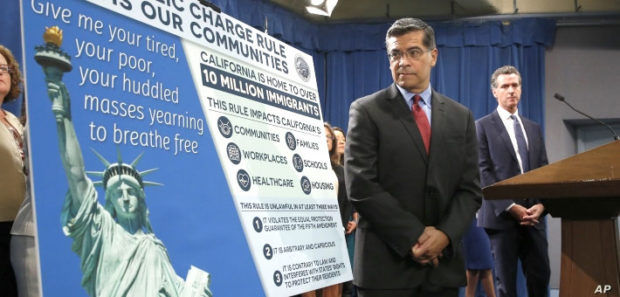Immigrants avoiding medical, other benefits in fear of new public charge rule

California Attorney General Xavier Becerra, left, outlines the supposed effects on immigrants under the Trump administration’s new rules blocking green cards for many of those who receive government assistance, in Sacramento, California, Aug. 16, 2019. California is suing to stop the new rules. AP PHOTO
Last year, Elizabeth Villafranca began feeling sick. She went to an emergency room and went through several tests. In her mid 50s, Villafranca was shocked with what the doctor told her: she had breast cancer.
Since her diagnosis, Villafranca, an immigrant from the Philippines who is currently applying for a green card, has been getting her cancer treatment from the Los Angeles County Hospital. While she works as a sales representative, her income is so low that she’s eligible to be on MediCal, California’s Medicaid healthcare program, which fully pays her expensive medical care.
But when she heard about the Trump administration’s public charge rule, Villafranca, whose last name has been changed to protect her privacy, feared that she would run into problems with her green card application.
The rule would give the Department of Homeland Security (DHS) the vast powers to deny immigrants a work visa or a green card if they receive any public benefits—including Medicaid, food stamp or housing assistance.
Villafranca wanted to terminate her Medicaid and stop her cancer treatment.
Described by many in the immigrant communities as punitive, the new public charge rule—if enacted—would open the doors of permanent residence only to immigrants deemed “self-sufficient” through a highly discretionary process.
The administration claims the rule would save the U.S. government billions of dollars and act as deterrent to immigrants coming to the United States.
But based on the 837-page new public charge regulation, Villafranca is not and will not be subject to the new rule. The Department of Homeland Security will apply this rule only to applications and petitions submitted or postmarked, if applicable, on or after the effective date, October 15.
The rule also does not apply to U.S. citizens, even if the U.S. citizen is related to the immigrant subject to the public charge ground of inadmissibility. It also does not apply to asylum-seekers, refugees, or other vulnerable populations for whom the DHS has statutory discretion to waive this ground of inadmissibility.
Villafranca’s fear is becoming far too common among immigrants who are applying for a green card, according to immigrant rights advocates, ever since the Trump administration announced a new public charge rule, which will go into effect Oct. 15, 2019, if it survives legal challenges—including suits by California, New York and Washington.
Advocates say it’s a heartbreaking situation that puts immigrant families to choose between getting medical treatment for a life-threatening illness or putting food on the table for their children, and the promise of getting a green card, which is a path to becoming a U.S. citizenship.
“We’ve been getting calls on how [the public charge rule] affects their personal case,” said Jenny Seon, an attorney and immigrant legal services director for Korean Resource Center in Los Angeles, California, the organization that is helping Villafranca’s immigration case. “It’s definitely a huge concern for many immigrants.”
Jackie Vimo, a policy analyst for the National Immigration Law Center, said that the new public charge rule still remains unclear.
“The devil is in the details,” Vimo said. “Unfortunately, this will likely increase confusion and fear broadly across immigrant families. It’s what we call the chilling effect.”
But despite the fears and concerns, advocates across the country encourage immigrants not to terminate their current public aid before this public charge rule takes effect on Oct. 15, and to keep track of any development as this rule may be further delayed due to court challenges.
Immigrants who are on public assistance, advocates say, should evaluate their own situation. It does not mean that because they are on public programs, it will automatically make them a public charge.
“Every case is different. It’s not a one-shot deal—every individual’s full circumstance will be considered,” Seon said. “We urge immigrants who have concerns to speak about their situation. Like my organization, there are many free service legal providers out there.”
Immigration officials will look at the person’s overall circumstances to determine the likelihood to become dependent on the government in the future, advocates said. For example, if the person is working but is in dire medical condition, like cancer in the case of Villafranca, immigration officials will look at the situation from all these factors.
Villafranca and her young son, Peter, came to the United States as tourists in 2007. They overstayed their tourist visas and became undocumented.
When Peter turned 18, he enlisted in the U.S. military service, which gave him a path to legalize his immigration status; eventually, he obtained his U.S. citizenship. Peter filed a green card petition for her mother last year, before his mother learned about her cancer.
“It’s really helpful to spread the word about it [public charge rule] to your family members, friends and around your community,” according to Seon. “But there’s no need to be scared. If you have concerns, get support from a trusted immigration lawyer.”
“It’s good to be realistic, but we also don’t want to spread out misinformation. Ultimately, we really don’t know how this is going to play out,” Vimo added.
“The three things to keep in mind: the new rule is not retroactive, it’s good to find out whether it does or does not apply to you, and it could also be changed. It’s not set in stone forever, and we can still fight back.”

